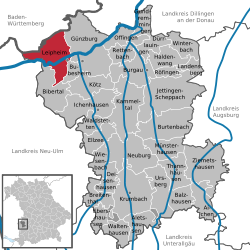Leipheim
| Leipheim | ||
|---|---|---|
|
||
| Coordinates: 48°26′56″N 10°13′15″E / 48.44889°N 10.22083°ECoordinates: 48°26′56″N 10°13′15″E / 48.44889°N 10.22083°E | ||
| Country | Germany | |
| State | Bavaria | |
| Admin. region | Schwaben | |
| District | Günzburg | |
| Government | ||
| • Mayor | Christian Konrad (CSU) | |
| Area | ||
| • Total | 32.15 km2 (12.41 sq mi) | |
| Elevation | 470 m (1,540 ft) | |
| Population (2015-12-31) | ||
| • Total | 6,926 | |
| • Density | 220/km2 (560/sq mi) | |
| Time zone | CET/CEST (UTC+1/+2) | |
| Postal codes | 89340 | |
| Dialling codes | 08221 | |
| Vehicle registration | GZ | |
| Website | www.leipheim.de | |
Leipheim is a town in the district of Günzburg, in Bavaria, Germany. It is situated on the Danube, 5 kilometres (3 miles) west of Günzburg, and 17 kilometres (11 miles) northeast of Ulm. The village Riedheim and the hamlet Weissingen are districts of Leipheim. Since 1993, Leipheim has been twinned with the Hungarian town Fonyód.
Between 1270 and 1373, Leipheim was owned by the family of Güß von Güssenberg who arranged for it to be granted market privileges in 1327 and town privileges in 1330 through Louis IV (Ludwig the Bavarian). In 1343, ownership was transferred to the Count of Württemberg. In 1453, the Free Imperial City of Ulm purchased the town from Count Ulrich V, Count of Württemberg for 23,000 Gulden. When Ulm converted to Protestantism in 1531, Leipheim officially turned Protestant as well.
During the German Peasants' War in 1525, roughly 5,000 peasants called the Leipheimer Haufen (literally: the Leipheim Bunch) gathered near Leipheim to rise against the city of Ulm and were subsequently defeated by the army of the Swabian League. During the German Mediatisation in 1803, the town was integrated into Bavaria. Leipheim was one of the few possessions of the Free Imperial City of Ulm to remain Bavarian after 1810 when Bavaria was forced to transfer certain borderland back to Württemberg. In the course of the administrative reform of Bavaria in 1818 under King Maximilian I Joseph of Bavaria, the community emerged in its current form.
...
Wikipedia



